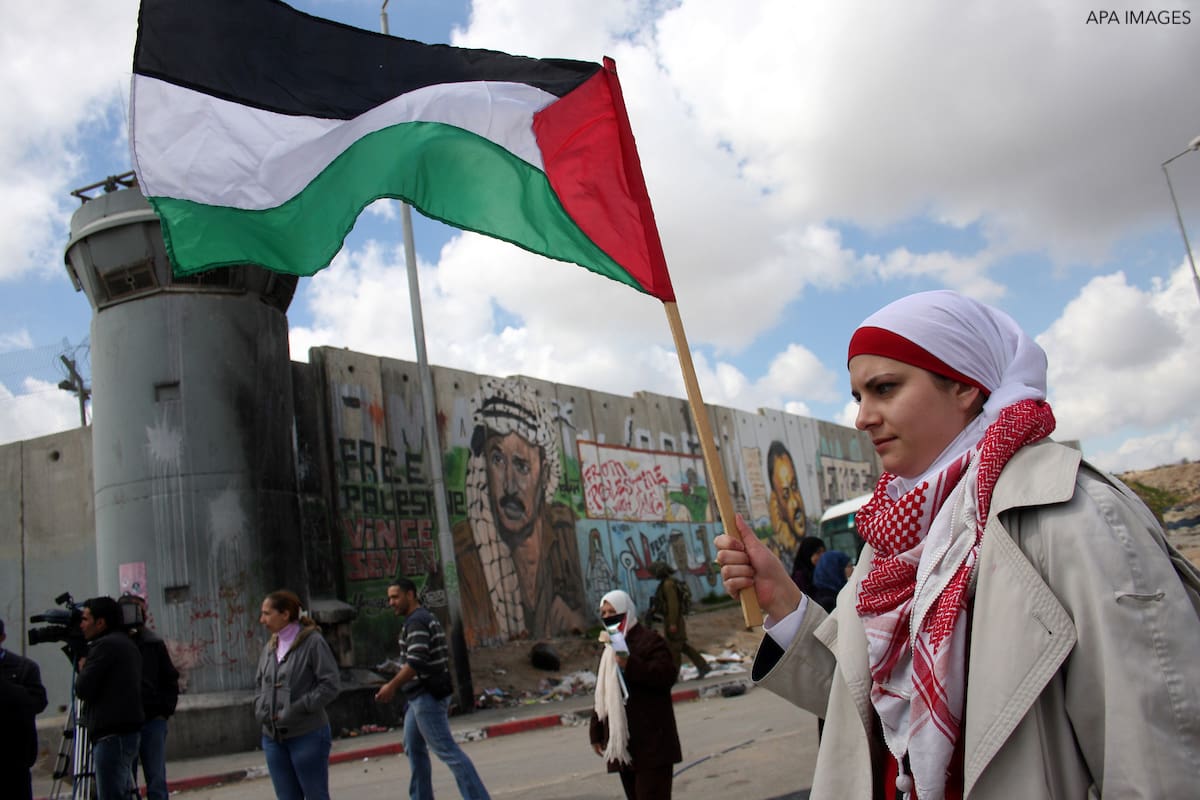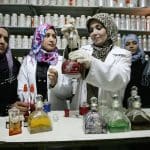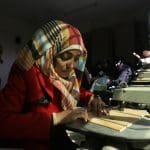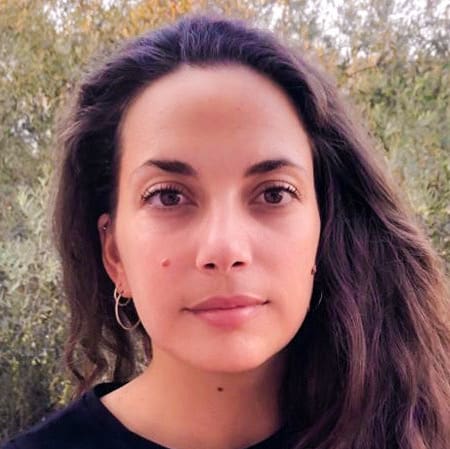
Executive Summary
Though Palestinian women have always played a fundamental role in the struggle for liberation from the Israeli settler colonial regime, they have faced consistent political marginalization. The overarching force suppressing Palestinian women’s politicization has been and continues to be the Israeli regime, but it is also important to recognize the forces within the Palestinian and international communities that contribute to the weakened political role of Palestinian women.
Palestinian women’s depoliticization has become more multifaceted and entrenched since the 1990s, when the Oslo Accords unleashed a myriad of changes in the structure of Palestinian society and governance. One of these changes was the professionalization and bureaucratization of civil society organizations, which created a distance between them and local grassroots communities. It also caused them to shift their focus to project deadlines, budgets, funding proposals, and annual reports, all of which were answerable to the international donor community.
The repercussions of this change are particularly noticeable in the post-Oslo lexicon of women’s rights. Many terms or buzzwords used to obtain project funding have been defined by international organizations that place their own meanings and conditions upon them. For example, the term “empowerment” is limited to socioeconomic empowerment and participation in “decision-making,” rather than empowering women to resist the occupation and build a vision for a postcolonial world. While this process of “NGO-ization” has demobilized many groups within Palestinian society, women remain disproportionately affected due to institutional tendencies to exclude women from the political sphere.
The current inclusion of women within institutional Palestinian politics remains very shallow. For instance, of the PLO Executive Council’s 15 members, only one is female. Out of the 16 governorates in the West Bank and Gaza, only the governorate of Ramallah and El Bireh has a female governor. Similarly, the current government headed by Mohammad Shtayyeh has a mere three female cabinet ministers out of 22.
That Palestinian women are often lacking the most basic legal protections and political representation means that they are particularly vulnerable when it comes to the weaponization of their bodies. The threat of sexual violence and the use of sexual harassment are therefore particularly powerful weapons.
The Israeli regime’s use of gendered tactics to oppress Palestinian women, including harassment, threats of sexual violence, and imprisonment, has contributed to the enforcement of gender stereotypes and patriarchal narratives, excluding women from the political sphere. The PA has adopted gendered mechanisms similar to those used by Israeli forces to deter female participation in political activities. Demonstrations and protests are often sites of gendered violence; in more severe cases physical sexual harassment occurs, with women grabbed and groped.
It is important to note that Palestinian women have not been passive in the face of gendered violence. They have, for instance, long confronted the weaponization of their bodies through such tactics as recognizing their right to remain silent during interrogations and remaining in groups or pairs at demonstrations.
Policy recommendations
- Palestinian women, collectives, groups, and organizations pursuing women’s rights and gender equality need to be restructured and revitalized into an autonomous women’s movement that struggles for women’s liberation in all spheres.
- Women’s groups and organizations must find a way to reconnect both with the grassroots and the liberation discourse.
- Groups and activists must engage with the political marginalization of women. In particular, men in these spaces need to be aware of the power dynamics that prevent women from participating and support women in fighting against them.
- Palestinian women should examine recent examples of other women in the region who have been part of processes of great political change.
- There is an urgent need to incorporate feminism into the Palestinian political project through the adoption of a new document of liberation, a document that would understand feminism not only as a theory but also as a practice and way of life that works toward the liberation of all people.
Overview
Though Palestinian women have always played a fundamental role in the struggle for liberation from the Israeli settler colonial regime, they have faced consistent political marginalization. This experience has become more multifaceted and entrenched since the 1990s, when the Oslo Accords unleashed a myriad of changes in the structure of Palestinian society and governance.12
These changes have included a newfound dependence on international donor aid among Palestinian civil society, including women’s organizations, and the bolstering of a corrupt and relentlessly patriarchal Palestinian Authority (PA) that complements rather than confronts the Israeli occupation and its oppression of the Palestinian population, both male and female. Such developments have caused today’s Palestinian women to endure perhaps even more formidable challenges when it comes to activism and political participation.
This policy brief addresses these issues, providing a historical consideration of Palestinian women’s political participation and then examining the reasons behind their de-politicization with a particular focus on the West Bank. It concludes by offering some potential avenues for Palestinian women and their allies to disrupt this process and revitalize the Palestinian liberation struggle through feminism.
Palestinian Women as Political Actors
Palestinian women have long been politicized individuals not just as wives, sisters, or mothers, but also as fighters, organizers, and leaders with agency that is not defined by their relationship to men. Looking back through Palestinian history, women have always been present and active at crucial political and national moments, though they have also had to navigate tensions among feminism, nationalism, and anti-colonial struggle.
In 1917, Palestinian women took part in demonstrations against the Balfour Declaration. Many women’s associations subsequently organized themselves under the Arab Women’s Congress, which convened in 1929 in Jerusalem. The congress created the Arab Women’s Executive Committee to carry out decisions, and this served as the beginning of an organized women’s movement in Palestine.3 Many of the women involved in the committee were of the urban upper and middle classes, particularly of Jerusalem, and were involved in community organizing and charitable works. Still, the committee was also a political body, with members boldly making speeches in spaces traditionally dominated by men, such as the Haram al Sharif and the Church of the Holy Sepulchre.
During the Palestinian uprising against the British in 1936, Palestinian women not only participated in demonstrations en masse, but were also part of smuggling operations delivering weapons and supplies to guerrilla fighters. Here, rural and working class Palestinian women played a vital role. They hid guns in their clothing or in the fields and traversed the terrain, sharing important information with guerillas such as British troop locations and supply routes.4
Over a decade later, the Nakba, or Palestinian catastrophe, of 1948 ripped apart Palestinian society, devastating the social and institutional infrastructure that the women’s movement had built in the preceding decades. The establishment of the Palestinian Liberation Organization (PLO) in 1964 provided centralization and an institutional home for many civil society organizations established before the Nakba. The fervent institution building that followed created many more employment opportunities for women. In addition, the General Union of Palestinian Women (GUPW) formed in 1965 and brought many women’s organizations under its umbrella, reviving the Palestinian women’s movement. These organizations offered educational, medical, legal, social, and vocational services to women, undertook advocacy, and created links with other women’s organizations around the world.
After the occupation of the West Bank and Gaza Strip in 1967, the GUPW began responding to the most immediate needs of Palestinian women and children, including by establishing health centers and orphanages. In the late 1960s Fatah took over the GUPW, and has since dominated the organization. Unlike some leftist political factions Fatah lacked an articulated stance or vision for Palestinian women. Despite this, the GUPW succeeded in opening branches in the diaspora, and has been particularly active in the Arab states with large Palestinian refugee populations. Today, it continues as an institution under the PLO.
Around the time of the formation of GUPW, Palestinian women were also involved in armed resistance, and most major militant political factions established training camps for female revolutionaries. A particularly well-known revolutionary was Layla Khaled, a member of the leftist Palestinian Front for the Liberation of Palestine (PFLP) who captured international attention for her role as commander of the Dawson’s Field operation, which made her the first woman to hijack an airplane. Khaled went on to become a speaker in the international solidarity scene. Another member of the PFLP, Shadia Abu Ghazaleh, was among the first Palestinian women to take part in military resistance after 1967. She later died while preparing an explosive device. Dalal Mughrabi, a Fatah member, was involved in a 1978 military operation that resulted in her own death as well as the deaths of 38 Israeli civilians.
Khaled, Abu Ghazaleh, and Mughrabi broke many traditional and nationalist conventions that had limited women’s role in the liberation struggle to caregivers of sons or husbands, whether fighters or prisoners. Although organizing and participating in armed resistance helped challenge traditional assumptions about gender roles, tensions between female emancipation and nationalism remained entrenched. Indeed, many Palestinian leaders privileged national liberation over the emancipation of Palestinian women, so much so that this stance became the norm.
Two decades later images of women and girls throwing stones, challenging soldiers, and leading marches during the First Intifada showed promising signs of a social restructuring. Women’s groups were solidifying their involvement in social works and political organizing during this period. This allowed women more movement outside of the home under the pretext of the struggle, bringing them into spaces that had previously been male only, such as political meetings and the front lines of demonstrations. This inevitably contributed to an erosion of the familial patriarchal authority.
Yet the First Intifada is also often romanticized in collective memory and writing, not only in terms of resistance and community organizing, but of the role of women in the struggle. It is important to note that some women faced societal backlash for political participation. For example, although many women who were imprisoned were glorified during their incarceration, soon after their release they often faced social obstacles, including not being able to marry or find employment. Furthermore, women were still often seen in relation to male figures, such as mothers and wives, as demonstrated by many political posters from the period.
Several years into the First Intifada, the Palestinian delegation at the 1991 Madrid Conference included two women (Hanan Ashrawi and Zahira Kamal) out of 21 figures. Yet the Oslo Accords several years later did not feature any women. Palestinian women were not the only ones to be marginalized at Oslo, as refugees in the diaspora and Palestinian citizens of Israel were also excluded. Oslo created a framework, albeit a limited one, in which the exiled male Palestinian leadership was empowered, rather than a framework for the empowerment of the Palestinian people as a whole. This exclusion further increased the tension between the national struggle and the women’s movement.
Depoliticizing Palestinian Women
The tension between nationalism and feminism has continued in the post-Oslo period, and has been accompanied by the trend of Palestinian women facing multiple forces that actively suppress their politicization and participation in political spaces. The overarching force has been and continues to be the Israeli regime, which has oppressed Palestinian women since the day it was established through gendered forms of violence as well empowering patriarchal structures through its relentless colonization and fragmentation of land and communities. Yet it is also important to recognize the forces within the Palestinian and international communities that contribute to the weakened political role of Palestinian women.
The NGO-ization of the Women’s Movement
The Oslo Accords not only created a new framework for “peace” and “state-building;” they also set in motion a fundamental transformation of Palestinian civil society, including the women’s movement. Foreign aid flooded into Palestine and created a situation in which civil society became dependent on external patronage. Whereas before Oslo political parties mainly supported civil society organizations, the post-Oslo era saw a deliberate weakening and breaking of these ties. Many scholars have identified this process as “NGO-ization,” which Islah Jad aptly describes as circumstances in which “issues of collective concern are transformed into projects in isolation from the general context in which they arise, without consideration of the economic, social, and political factors affecting them.”
The professionalization and bureaucratization of civil society organizations created a distance between them and local grassroots communities. The focus became centered on project deadlines, budgets, funding proposals, and annual reports, all of which were answerable to the international donor community. The shift to a donor-led agenda also distanced many organizations from the politicized rhetoric of liberation and nationalism. Many groups and organizations within the women’s movement were also subject to this transformation.
Many Palestinian leaders have privileged national liberation over the emancipation of Palestinian women Share on XThis change is particularly noticeable in the post-Oslo lexicon of women’s rights within Palestinian civil society. Many terms or buzzwords used to obtain project funding have been defined by UN agencies and other international organizations that place their own meanings and conditions upon them. For example, the term “empowerment” is limited to socioeconomic empowerment and participation in “decision-making,” rather than empowering women to resist the occupation and build a vision for a postcolonial world. Indeed, many projects focus solely on household economic empowerment, aiming to help women become financially less dependent on male breadwinners. This stands in stark comparison to the many female-led cooperatives established before Oslo that attempted to gain economic independence from Israel and were articulated as a form of resistance, such as the women’s produce cooperatives established by the Palestinian Union of Women’s Work Committees in the West Bank and Gaza during the First Intifada.
A more recent example of this donor-led transformation can be seen in a week-long campaign launched in early 2019 by UN agencies, international organizations, and Palestinian NGOs. The campaign, called “My Rights, Our Power,” was meant “to raise awareness on women’s fundamental human rights” and domestic violence in particular. It focused on five areas of concern: the right to a life free of violence, the right to achieve justice, the right to seek help, the right to equal opportunities, and the right to make one’s own choices. The campaign omitted the Israeli military occupation of the West Bank and Gaza Strip, as well as its overall structure of apartheid, as major contributing factors to rights violations committed against Palestinian women. Indeed, the words “occupation” or “Israel,” let alone “apartheid” or “colonialism,” did not appear in press releases and campaign materials. This reflects a trend in the international aid and donor community’s discourse in which “issues” and “barriers” to women’s rights are spoken of in a political vacuum to avoid any Israeli discomfort. This is a clear example in which dependency on the donor community rendered organizations unwillingly complicit in the depoliticization of the Palestinian women’s struggle.
While this process of NGO-ization has demobilized many groups within Palestinian society, women remain disproportionately affected due to institutional patriarchal tendencies to exclude women from the political sphere.
The Veneer of Institutional Inclusion
The return of the PLO to the West Bank and Gaza Strip and its subsequent devolution into the Palestinian Authority (PA) left many on the ground frustrated, particularly women grassroots activists from the First Intifada who then lost their leadership roles to predominately male politicians, highlighting once again the tensions between the national struggle and women’s liberation. In 2003, in part to alleviate this tension, the PA established the Palestinian Ministry of Women’s Affairs, and between 2012 and 2014 under Minister Haifa Al Agha it created gender units in all Palestinian governmental agencies. These units are supposed to deal with gender issues, particularly female participation in institutional politics, yet their implementation and outcomes remain minimal. In reality, it is likely that they were established to appease certain requirements, particularly those of funders, and respond to both domestic and international pressures to create a more gender-balanced political structure.
The ‘NGO-ization’ of Palestinian civil society has demobilized many groups, but women remain disproportionately affected Share on XThe current inclusion of women within institutional Palestinian politics in the West Bank and Gaza Strip remains very shallow. Although the Palestinian Legislative Council has maintained a 20% quota of women since 2006 – a development Palestinian activists and women’s organizations fought hard for – the percentage remains low. Moreover, other bodies have even lower proportions of inclusion. Of the PLO Executive Council’s 15 members, only one is female – Hanan Ashrawi. Out of the 16 governorates in the West Bank and Gaza, only the governorate of Ramallah and El Bireh has a female governor – Laila Ghannam. Similarly, the government as of April 2019 headed by Mohammad Shtayyeh has a mere three female cabinet ministers out of 22 – Mai Kaileh, Minister of Health; Rola Maayya, Minister of Tourism; and Amal Hamad, Minister of Women’s Affairs. These women, with the exception of Ashrawi, come from a Fatah background. This is unsurprising considering the domination of Fatah over the Palestinian political scene and the recent efforts by President Mahmoud Abbas to consolidate power within his party.
These attempts to consolidate power are indicative of the politics inherent in the PA, namely those of one-man leadership, rule by presidential decree, and a failure to separate legislative, judicial, and executive powers. Furthermore, the lack of democracy and democratic processes – Abbas is well into a decade past his mandated term – has allowed for nepotism and patronage. It is thus unsurprising that under the PA patriarchal tendencies have solidified.
The PA attempted to elevate the status of Palestinian women in 2014 when it acceded to the UN Convention on the Elimination of All Forms of Discrimination against Women (CEDAW) without any reservations. It was the first country in the Middle East and North Africa to do so and was heralded by some, including those in the international community, as demonstrating significant progress on women’s rights. Yet several issues render the accession less significant than it might seem. Firstly, the CEDAW text has not been published in the PA’s Official Gazette and as such remains non-binding for domestic law. Secondly, a November 2017 decision by the Supreme Constitutional Court, which regulates the status of international agreements in the Palestinian legal system, allows for courts to not apply agreements that conflict with Palestinian law. This allows for unregulated executive powers and for the legislature’s maintenance of the overarching patriarchal authority.
Weaponizing Women’s Bodies
The fact that Palestinian women are often lacking the most basic legal protections and political representation means that they are particularly vulnerable when it comes to the weaponization of their bodies. Sexual harassment and violence are sensitive topics in Palestinian society, and a social stigma is often attached to those who have suffered them. The threat of sexual violence and the use of sexual harassment are therefore particularly powerful weapons. Both the Israeli regime and the PA have used such gendered violence to deter women from being politically active.
Since its establishment the Israeli regime has systematically used gendered tactics to oppress Palestinians. This has contributed to the enforcement of gender stereotypes and patriarchal narratives, excluding women from the political sphere or targeting those who are politically active. Targeting manifests itself in a variety of ways and can include harassment, threats of sexual violence, and imprisonment, the latter being the most effective way to curtail political work. Indeed, female political leaders have been consistently imprisoned by the Israeli regime, including legislator Khalida Jarrar.
During imprisonment, Palestinian women are often subjected to gendered violence in an attempt to “break” them. For example, Khitam Saafin, the leader of the Union of Palestinian Women’s Committees, spent three months in Israeli administrative detention. During that time she reported that Israeli soldiers took pictures of her on their phones and subjected her to unnecessary strip searches. The Israeli prison authorities are also known to deny women sanitary towels and restrict their access to bathrooms when they are menstruating.
The current inclusion of women within institutional Palestinian politics in the West Bank and Gaza Strip remains very shallow Share on XInterrogations by Israeli soldiers or security forces also often include sexual harassment or threats of sexual violence to pressure women and girls to sign confessions or give information. This was demonstrated in a leaked video of the December 2017 interrogation of the teenager Ahed Tamimi, who was arrested for slapping an Israeli soldier who had invaded her home and had previously been part of a raid that resulted in her cousin being shot in the head. Ahed was subjected to an interrogation in which two male officers verbally harassed her and made comments about her body.
In recent years the PA has increasingly cracked down on activism and activities that challenge its authoritarianism, using such brutal techniques as detention, interrogation, surveillance, limitations on mobilization, and cyber attacks. It has adopted gendered mechanisms similar to those used by Israeli forces to deter female participation in political activities.
Demonstrations and protests have often been sites of gendered violence. PA security forces use insults and insinuations that often amount to verbal sexual harassment, in addition to telling women they should be at home and not in the streets. This draws on misogynist and global notions of honor and shame, which can also be mobilized against women’s families. PA security forces have been known to visit women’s and girls’ fathers to “discuss” their activism. For some women, this has serious repercussions and means they are prevented by their families from taking part in political activities. There have also been cases in which security forces have gone to a female activist’s place of work and have spoken to her employer in an attempt to get her fired. This type of sabotage occurs more easily via social media, as rumors and slanderous language can be spread quickly and anonymously in ways that become nearly impossible to refute.
In more severe cases physical sexual harassment occurs, with women grabbed and groped at demonstrations. This was the case at a June 2018 protest demanding the PA lift the sanctions on Gaza, in which Fatah loyalists harassed and assaulted women at the behest of the PA security forces. The sexual harassment of women in such spaces aims to punish and deter them from taking part, but it also encourages male activists to deter female participation out of fear for women’s safety.
It is important to note that Palestinian women have not been passive in the face of gendered violence. They have, for instance, long confronted the weaponization of their bodies through such tactics as recognizing their right to remain silent during interrogations and remaining in groups or pairs at demonstrations. Another tactic is to mentally compartmentalize. Indeed, one activist told this author, “I mentally prepare myself before the demonstration, I tell myself, ‘Today my body is not mine.’”
Liberating All Palestinian People
The aim of this policy brief has not been to romanticize the pre-Oslo period, but rather to address how the political marginalization of Palestinian women has accelerated with the entrenchment of the military occupation, the increasingly repressive Palestinian authorities, and the weakening connection between civil society and the grassroots. Moreover, the entire Palestinian liberation project has been geographically, socially, and politically fragmented, resulting in a situation of historic vulnerability. While discussions revolve around efforts to revive it, the important question Palestinians must ask themselves is whether they can reignite a path to liberation with half of their population marginalized from the process.
Both the Israeli regime and the Palestinian Authority have used gendered violence to deter women from being politically active Share on XWith this in mind, what follows are recommendations for disrupting this process of political marginalization and revitalizing the liberation struggle through feminism:
1. Palestinian women, collectives, groups, and organizations pursuing women’s rights and gender equality need to be restructured and revitalized into an autonomous women’s movement that struggles for women’s liberation in all spheres, including political, economic, and social spheres. The need for women’s autonomy is imperative in a context of patriarchy, where male domination is present in all areas. Organizational autonomy does not mean a separation of struggles, but rather provides a space for women to think more freely and collectively about liberation. Women’s rights must be both individual and collective and must not be separated from the collective right of indigenous Palestinians to be free of settler colonialism.
2. Women’s groups and organizations must find a way to reconnect both with the grassroots and the liberation discourse. One way to do this is to return to collectivism and tackle elitism within the NGO network by making processes more democratic and representative. This also requires moving toward self-sufficiency to weaken the grip of donors, which could include a membership-based system, and pave the way for economic sovereignty.
3. Groups and activists must engage with the political marginalization of women. In particular, men in these spaces need to be aware of the power dynamics that prevent women from participating and support women in fighting against them. For example, in meetings, discussions, and demonstrations, men should step aside and create space so that women can take leading roles. Additionally, rather than telling women not to stand on the front line out of fear their bodies will be weaponized against them, men should join women in coming up with tactics to tackle this weaponization.
4. While bearing in mind the specific context of settler colonialism, Palestinian women should also examine recent examples of other women in the region who have been part of processes of great political change, such as in Tunisia and Sudan. It is equally important to rebuild historic solidarities, such as with the Kurdish Women’s Movement, rather than looking toward the West, to learn and develop by example.
5. Palestinian nationalism has long focused around macho imagery embodied in the male fighter or prisoner, with women often only discussed in relation to men. This has resulted in a liberation politics that is not only exclusive and dominating of women but also oppresses men. There is therefore an urgent need to incorporate feminism into the Palestinian political project through the adoption of a new document of liberation, a document that would understand feminism not only as a theory but also as a practice and way of life that works toward the liberation of all people.
Only through such actions can the Palestinian leadership and civil society begin to tap the strength of Palestinian women in the Palestinian struggle for freedom, justice, and equality.
- This policy brief was produced with the support of the Heinrich-Böll-Stiftung. The views expressed herein are those of the author and therefore do not necessarily reflect the opinion of the Heinrich-Böll-Stiftung.
- To read this piece in French or Spanish, please click here or here. Al-Shabaka is grateful for the efforts by human rights advocates to translate its pieces, but is not responsible for any change in meaning.
- The term “women’s movement” in this policy brief is used in a broad sense to refer to the collection of groups and organizations working to further women’s rights in Palestine.
- Fayha’ Abdul Hadi, “Adwar al-mar’a al-filastiniyya fi al-thalathinat 1930 – al-musahama al-siyasiyya lil mar’a al-filastiniyya [The Role of the Palestinian Woman in the Thirties, the Political Participation of the Palestinian Woman],” Al-Bira: Markaz al-Mar’a al-Filastiniyya lil-Abhath wa al-Tawthiq, 2005, 84.











